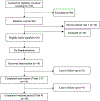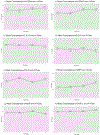Immune biomarkers in non-treatment-seeking heavy drinkers who used a probiotic supplement for 30 days: An open-label pilot study
- PMID: 37604322
- PMCID: PMC10875145
- DOI: 10.1016/j.alcohol.2023.08.007
Immune biomarkers in non-treatment-seeking heavy drinkers who used a probiotic supplement for 30 days: An open-label pilot study
Abstract
Alcohol use disorder (AUD) is associated with significant psychological and economic burdens, as well as physical comorbidities that can lead to death. Previous research has found that probiotics may reduce inflammatory biomarkers in persons with AUD and comorbid conditions such as cirrhosis of the liver. This relationship has not been explored in heavy drinkers without comorbid conditions. In a proof-of-concept study, individuals who were heavy drinkers without known comorbidities received a 30-day course of a daily probiotic supplement in an open-label pilot trial. Eligible participants (N = 16) met NIAAA guidelines for heavy alcohol use and did not report any preexisting medical problems. Blood samples were taken at four timepoints: prior to the probiotic course, at the midpoint, at the end, and after a washout period of at least one month. Immunoassays were conducted on plasma samples to quantify the following inflammatory biomarkers: IL-6, IL-8, IL-10, LBP, MCP-1, sCD14, sCD163, and TNF-α. Linear mixed models were used to test within-subjects changes in biomarker concentrations over the study period, with alcohol use included as a time-varying covariate. Biomarker concentrations did not change significantly. A higher number of heavy drinking days was statistically associated with higher concentrations of IL-6 (F(1,8) = 6.66, p = 0.0326) and IL-8 (F(1,17) = 6.38, p = 0.0218). Greater days since last drink was associated with a lower concentration of MCP-1 (F(1,17) = 5.77, p = 0.028). In summary, biomarker trajectories were associated with alcohol consumption variables, but not probiotic use, in this open-label pilot study. Randomized controlled trials are needed to evaluate fully the potential benefits of probiotics in heavy drinkers without known comorbidities and under conditions of non-abstinence.
Keywords: alcohol use; cytokines; heavy drinking; immune activation; inflammation; probiotic.
Copyright © 2023 Elsevier Inc. All rights reserved.
Figures



Similar articles
-
HIV Infection, HCV Coinfection, and Alcohol Use: Associations with Microbial Translocation and Immune Activation.Alcohol Clin Exp Res. 2019 Jun;43(6):1126-1134. doi: 10.1111/acer.14032. Epub 2019 Apr 29. Alcohol Clin Exp Res. 2019. PMID: 30908642 Free PMC article.
-
Circulating Immune and Endocrine Markers in Currently Drinking and Abstinent Individuals With Alcohol Use Disorder and Controls.Addict Biol. 2025 May;30(5):e70039. doi: 10.1111/adb.70039. Addict Biol. 2025. PMID: 40317574 Free PMC article.
-
An evening of alcohol consumption negatively impacts next-day immune fitness in both hangover-sensitive drinkers and hangover-resistant drinkers.Addict Behav. 2023 Oct;145:107776. doi: 10.1016/j.addbeh.2023.107776. Epub 2023 Jun 12. Addict Behav. 2023. PMID: 37331135
-
Heart rate variability in alcohol use: A review.Pharmacol Biochem Behav. 2019 Jan;176:83-92. doi: 10.1016/j.pbb.2018.12.003. Epub 2018 Dec 6. Pharmacol Biochem Behav. 2019. PMID: 30529588 Review.
-
Alcoholics Anonymous and other 12-step programs for alcohol use disorder.Cochrane Database Syst Rev. 2020 Mar 11;3(3):CD012880. doi: 10.1002/14651858.CD012880.pub2. Cochrane Database Syst Rev. 2020. PMID: 32159228 Free PMC article.
References
-
- Afford SC, Fisher NC, Neil DA, Fear J, Brun P, Hubscher SG, & Adams DH (1998). Distinct patterns of chemokine expression are associated with leukocyte recruitment in alcoholic hepatitis and alcoholic cirrhosis. J Pathol, 186(1), 82–89. 10.1002/(SICI)1096-9896(199809)186:1<82::AID-PATH151>3.0.CO;2-D - DOI - PubMed
-
- Babor TF, Higgins-Biddle JC, Saunders JB, & Monteiro MG (2001). The Alcohol Use Disorders Identification Test: Guidelines for Use in Primary Care (2nd ed.). World Health Organization.
Publication types
MeSH terms
Substances
Grants and funding
LinkOut - more resources
Full Text Sources
Medical
Miscellaneous

